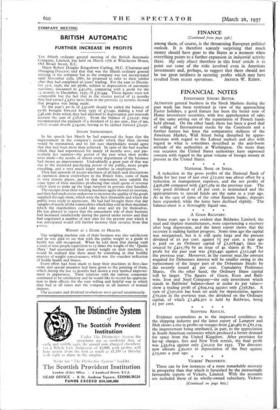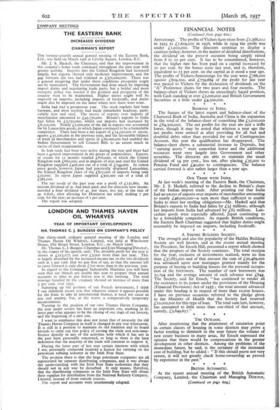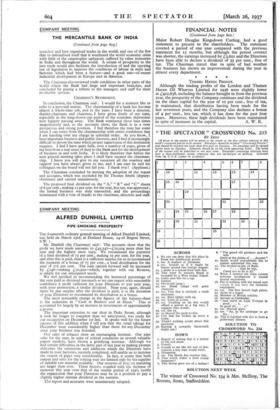FINANCIAL NOTES
INVESTMENT STOCKS Bas I ER.
ALTHOUGH general business in the Stock Markets during the past week has been restricted in view of the approaching Easter holidays, a good feature has been the better tone of Home investment securities, with less apprehension of sales of the same arising out of the repatriation of French funds held abroad. On the other hand, there has been -a good deal of selling of International stocks by the Continent and a further feature has been the comparative dullness of the American Market, Wall Street being disturbed by appre- hensions with regard to the Labour outlook and also with regard to what is sometimes described as the anti-boom attitude of the authorities at Washington. On more than one occasion the United States authorities have expressed concern with regard to the great volume of foreign money at present in the United States.
* * * * NATIONAL BANK OF INDIA.
A reduction in the gross profits of the National Bank of India for last year of just over Et i,000 was about offset by a reduction in management expenses, and the net profits of £456,286 compared with £457,569 in the previous year. The very good dividend of 18 per cent. is maintained and the appropriations to special funds are the same as a year ago. As in the case of some of the other Eastern banks, deposits have expanded, while the loans have declined slightly. The balance-sheet is a thoroughly liquid one.
* * * * A GOOD RECOVERY.
Some years ago it was evident that Baldwins Limited, the steel and tinplate manufacturers, were experiencing a recovery after long depression, and the latest report shows that the recovery is making further progress. Some time ago the capital was reorganised, but it is still quite large and the present dividend of to per cent. against 74 per cent. a year ago is paid on an Ordinary capital of £2,078,947, since in- creased by £415,789 by an issue of 4s. shares at 8s. The profit for the past year was £630,440 against £512,246 for the previous year. Moreover, in the current year, the amount required for Debenture interest will be smaller owing to the replacement of the larger part of the Debenture Stocks by the recently issued 44 per cent. Cumulative Preference Shares. On the other hand, the Ordinary Share capital will be larger. The figures of Guest, Keen and Bald- wins Iron and Steel Company—the only investment which stands in Baldwins' balance-sheet at under its par value— show a trading profit of £609,104 against only £258,891. A sum of £250,000 has been set aside for depreciation, against £70,000 in the previous year, the dividend on the Ordinary capital, of which £1,489,302 is held by Baldwin, being
24 per cent. * * * * SHIPPING RESULTS.
Evidence accumulates as to the improved conditions in the shipping industry and the latest report of Lamport and Holt shows a rise in profits on voyages from £40,465 to £61,119, the improvement being attributed, in part, to the appreciation in South American currencies which produced a better demand for space from the United Kingdom. After provision for lay-up charges, fees and New York rentals, the final profit was £43,614 against only £20,005 for 1935. The directors now allocate £30,003 to depreciation of the fleet against £ x5,000 a year ago.
(Continued on page 602.)
* * * * VICKERS' PROSPERITY.
There can be few instances of a more remarkable recovery in prosperity than that which is furnished by the increasingly favourable reports of Vickers Limited. With the accounts are included those of its wholly-owned subsidiary, Vickers-
FINANCIAL NOTES (Continued from page 600.)
Armstrongs. The profits of Vickers have risen from £1,368,000 in 1935 to L1,619,000 in 1936, while in 1934 the profit was under £1,00o,000. The directors continue to display a cautious policy, however, in the matter of dividend distributions, the dividend on the present occasion being simply raised from 8 to so per cent. It has to be remembered, however, that the higher rate has been paid on a capital increased by 5o per cent. by the bonus issue last year, and is, therefore, equivalent to 15 per cent. on the capital as it stood a year ago. The profits of Vickers-Armstrongs for the year were £768,000 against £6o9,000, and £759,684 of the profit for last year was passed to Vickers by the declaration of dividends on the "A" Preference shares for two years and four months. The balance-sheet of Vickers shows an exceedingly liquid position, with Cash standing at over £2,000,000 and British Government Securities at a little under £4,500,000.
* * * * BANKING IN INDIA.
The feature of the latest report and balance-sheet of the Chartered Bank of India, Australia and China is the expansion in the total of the balance-sheet of something like £5,000,000 to £64,500,000. The net profits for the year are just a trifle lower, though it may be noted that whereas a year ago the net profits were arrived at after providing for all bad and doubtful debts other than provided for out of Contingencies Account, this year the qualification has disappeared. The balance-sheet shows a substantial increase in Deposits, but " earning assets " were somewhat lower and the additional resources went very largely into Government and other securities. The directors are able to maintain the usual. dividend of 14 per cent., less tax, after placing £35,000 to Pension Fund and £40,000 to contingencies. The balance carried forward is also rather larger than a year ago.
* * * * OUR TRADE WITH INDIA.
At last week's meeting of the Eastern Bank, the Chairman, Mr. J. S. Haskell, referred to the decline in Britain's share of the Indian import trade. After pointing out that India had an excess of exports over imports of merchandise amounting to nearly £46,000,4000—a sum more than sufficient to enable India to meet her sterling obligations—Mr. Haskell said that Britain's exports to India had fallen by £31 millions, although her imports from India had advanced by £8} millions. Lan- cashire goods were especially affected, Japan continuing to be a formidable competitor. As regards British conditions, the Eastern Bank Chairman suggested that higher duties might reasonably be imposed on imports, including foodstuffs.
* * * *
A STRONG BUILDING SOCIETY.
The strength and also the popularity of the Halifax Building Society are well known, and at the recent annual meeting the President, Sir Enoch Hill, presented a report which showed that the progress of the Society continues. The total receipts for the year, exclusive of investments realised, were no less than £37,885,000 and of that amount the sum of £20,489,000 was advanced upon new mortgages granted mainly for the purpose of buying or building houses for the personal occupa- tion of the borrowers. The number of new borrowers was 31,794 and the average amount of each advance was £644. The Society, said Sir Enoch, " has continued to render all the assistance in its power under the provisions of the Housing (Financial Provisions) Act of 1933 • the total amount advanced under this heading is in respect of more than to,000 houses. I have on previous occasions referred to the pledge given to the Ministry of Health that the Society had reserved £10,000,000 for this type of loan. The total sum lent, however, has amounted to little more than one-third of that amount, namely, £3,849,657."
TEE OUTLOOK.
After mentioning that the attainment of saturation point in certain classes of housing in some districts may prove a factor tending to diminish in the near future the volume of new estate business in many areas, Sir Enoch expressed the opinion that there would be compensations in the greater development in other districts. Among the problems of the immediate future, he said, is the certainty of the increased cost of building, but he added : " If this should prove not very severe, it will not greatly check home-ownership as proved by experience in the past."
* * * * BRITISH AUTOMATIC.
At the recent annual meeting of the British Automatic Company, Limited, the Chairman and Managing Director, (Continued on page 604.)
* * * *
FINANCIAL NOTES
(Continued from page 602.)
Major Robert Douglas Kingsdown Curling, had a good statement to present to the shareholders. The statement covered a period of one year compared with the previous statement for 15 months, but although the period covered was shorter, the earnings increased by £3,621 and the Directors have been able to declare a dividend of 3} per cent., free of tax. The Chairman stated that in spite of bad weather the business has shown an improvement during the year in almost every department.
* * * * THAMES HAVEN PROFITS.
Although the trading profits of the London and Thames Haven Oil Wharves Limited for 1936 were slightly lower at £422,638, including the balance brought in from the previous year, the prosperity of the Company continues and the dividend on the share capital for the year of to per cent., free of tax, is maintained, that distribution having been made for the last seventeen years, and the Company also declares a bonus of 4 per cent., less tax, which it has done for the past four years. Moreover, these high dividends have been maintained in spite of increases in the capital. A. W. K.












































 Previous page
Previous page